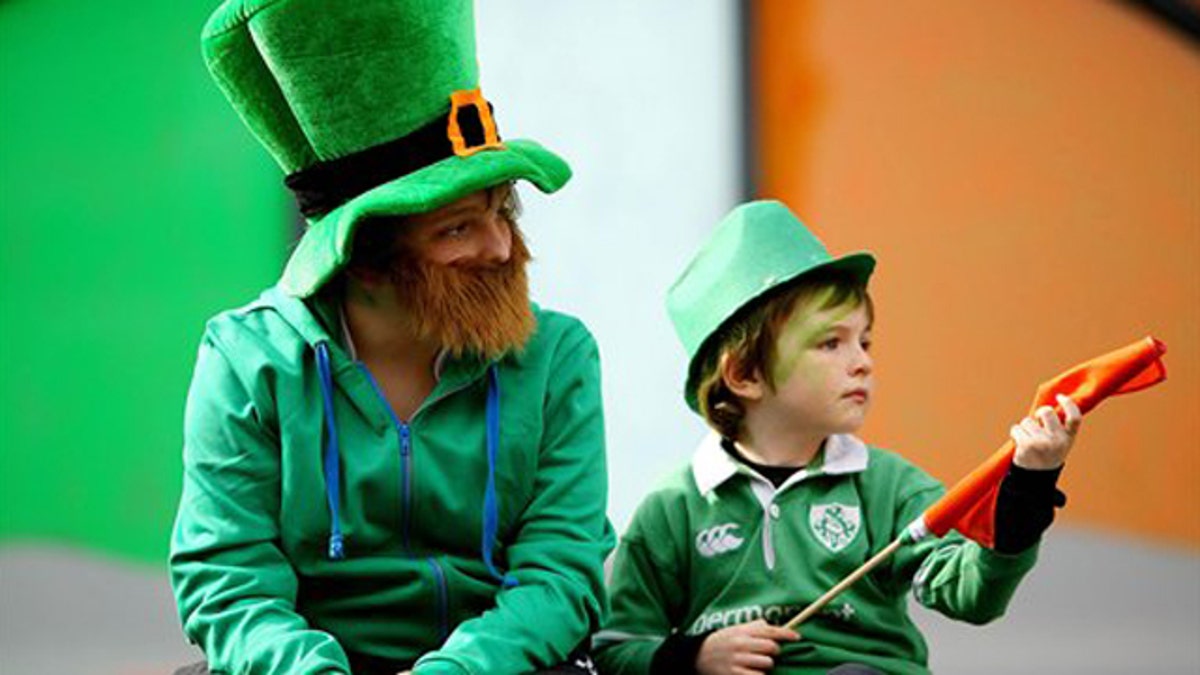
March 17: Children dressed as Leprechauns watch the St Patrick's Day parade in Dublin, Ireland. (AP)
Growing up in suburbia, the fact that my father was Irish was a source of near paralyzing embarrassment to me. It meant that he was unusual, and that made me unusual, which as a young boy was the last thing in the world I wanted to be. That he didn’t seem at all ashamed of his accent made it all the more unbearable.
My father had escaped an impoverished Ireland when he was twenty-one to travel the world. In 1977, after five years in the States, when I was three years old and my sister and I were jabbering away with American accents, he was struck with a nostalgia powerful enough to actually uproot us and move the family to an almost comically authentic Irish setting: a decommissioned old coastguard house in an small village called Ballymoney, overlooking the rough grey of the Irish Sea. It was chosen because it was the only place we could afford, but also because my father reveled in austerity.
“I don’t suppose there’s heat?” my mother asked.
“Course there is – a lovely fireplace in the main room. You’ll love it!”
“Because the kids really need to be…”
“Sure it’ll be the coziest home in Ireland!”
What my father considered cozy was not what most people considered cozy. My father’s cozy meant putting on every stitch of clothing you owned and cupping your hands around a mug of hot tea, then maybe sitting on a hard straight backed chair at a Spartan wooden table to do a few hours of writing.
We lasted only a year there, but we returned every summer. My father was exuberant in Ireland. It was the only time that I would ever see his bare arms and legs, during the six minutes of sunshine per day, when we would hustle down to the beach, my father shoving cows out of the way, and dive headlong into the frozen waters of the north Atlantic. He’d shout back to the beach for my sister Kate and me to peel off our heavy wool sweaters and join him.
Later, as we would sit in the pub on those rainy afternoons, dried sea salt stiffening our hair, my father would nurse a Guinness and we would eat crisps and drink orange sodas and he would encourage us to think of ourselves as Irish who happened to live in America.
“This is as much your home as anywhere!” he would proclaim – his common refrain – and clink his heavy black pint against our glasses.
In Ireland, I didn’t mind his accent. It made me feel less conspicuous in shops. At home in Poughkeepsie, NY, however, I wanted to hide him from the world. When kids came door to door selling newspapers and were surprised by his thick brogue, I wondered whether it was possible to actually die of embarrassment.
That all changed one Saint Patrick’s Day in 1986, when I was in seventh grade. March 17th that year was the day of the parent teacher conference. Parents were led into school by their children and shown around the classrooms, as teachers looked on proudly and answered questions. Our class looked like somebody had detonated a shamrock bomb. The festive green banner we’d made that morning in class draped across the blackboard. My father took this in stride. After many years in the States, was used to this kind of exuberant celebration of all things Irish on this day, of course, especially by the non-Irish.
Across the room, Nicole Shapley waved at me and came over, her mother in tow. My breath quickened. I had a crush on her, though clearly she had no idea. As twelve year olds, we stood next to each other awkwardly until our parents introduced themselves.
“Hi Mr. Grennan, I’m Nicole’s mom,” she said with a warm smile. “Oh, and Happy Saint Paddy’s Day!”
I cringed. My father never let us call it St. Paddy’s Day. (“It’s Saint Patrick, lad,” he’d say. “He’s the Patron Saint – he’s no need for a nickname.”) But my father just smiled his charming smile and clasped her hand.
“It’s a pleasure, Mrs. Shapley,” he said. “I’ve heard only wonderful things about yer daughter.”
Nicole’s eyes grew wide at hearing him. She looked at me, almost giddily. In a hushed voice she said, “Wait, your father is Irish Irish?”
I nodded. She had never looked at me like that before, so impressed, so intrigued. I kept as cool a face as I could, and leaned into my father.
“We’re both Irish,” I said.
Conor Grennan is the author of the New York Times bestseller, "Little Princes." He is the founder of Next Generation Nepal, a nonprofit organization dedicated to reconnecting trafficked children with their families in post-war Nepal. He is a graduate of the University of Virginia (1996) and the NYU Stern School of Business (2010), where he served as president of the student body. Currently he resides in Connecticut with his wife, son and daughter.
